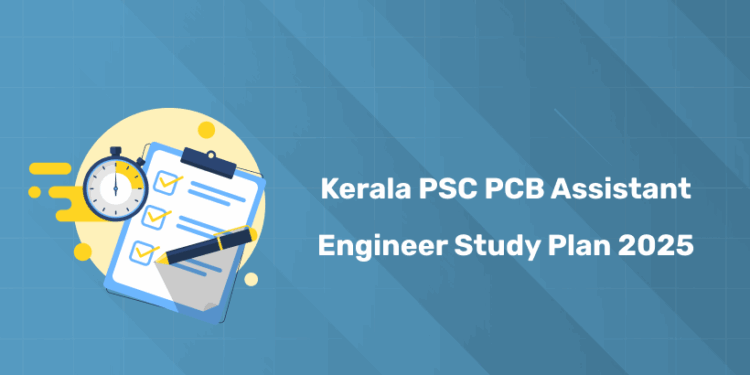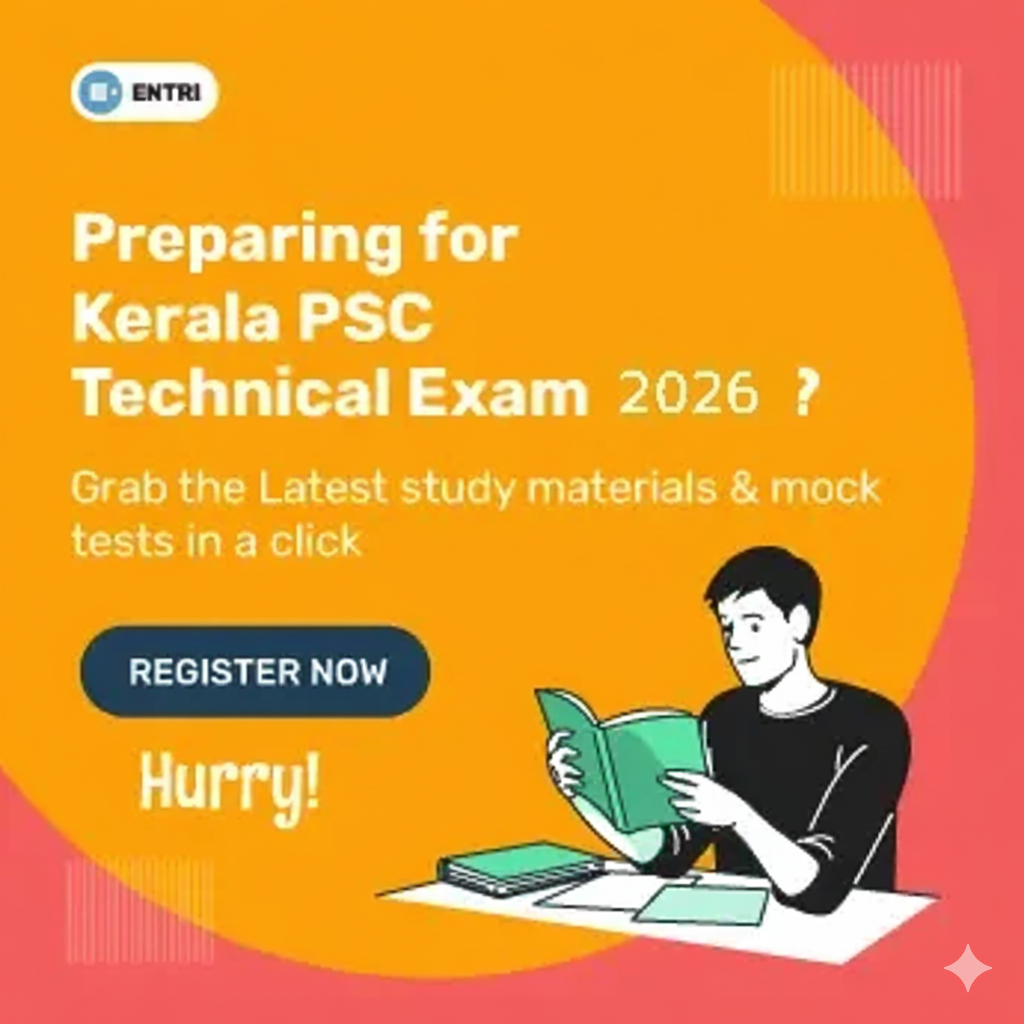Table of Contents
Kerala PSC is expected to announce the Assistant Engineer (AE) Exam Date 2025 for the Pollution Control Board soon. With the new notification released, aspirants should start their strategic preparation. In this blog, we provide a detailed study plan, carefully prepared by experts, covering the latest syllabus, previous year questions (PYQs), and preparation tips to help you crack the exam.
Kerala PSC Pollution Control Board AE Notification 2025 Highlights
| Event | Details |
|---|---|
| Recruiting Organization | Kerala Public Service Commission (KPSC) |
| Department | Kerala State Pollution Control Board |
| Post Name | Assistant Engineer |
| Category Number | 357/2025 |
| Pay Scale | ₹ 39,500 – 83,000 /- |
| Vacancies | Anticipated |
| Notification Release Date | September 15, 2025 |
| Application Start Date | September 15, 2025 |
| Last Date to Apply | October 10, 2025 (up to 12:00 midnight) |
| Mode of Application | Online only (via Kerala PSC Thulasi Profile) |
| Official Webiste | www.keralapsc.gov.in |
Kerala State Pollution Control Board Assistant Engineer Syllabus 2025 PDF
1: Between the period of 1858-1947, how many Viceroys ruled over India?
Candidates can download the complete syllabus PDF for the Kerala PSC Pollution Control Board Assistant Engineer Exam 2025 here. The PDF contains all topics from Mathematics, Mechanics, Structures, Surveying, Fluids, Water Resources, Geotechnical, Environmental, Chemical Engineering, and Process Instrumentation, making it easy to plan your preparation and track your progress.
Kerala PSC PCB Assistant Engineer (AE) Previous Question Paper PDF
| Paper Code | |
|---|---|
| 073/2022 |
Prepare for Kerala PSC Technical Exams with Entri
സർക്കാർ ജോലി എന്ന സ്വപ്നം ഇനി സ്വപ്നം മാത്രമല്ല! Join Kerala's Top-rated PSC Coaching Programs
Join NowKerala PSC PCB Assistant Engineer Study Plan 2025
Get ready for the Kerala PSC PCB AE Exam 2025 with our comprehensive study plan. Crafted from the latest syllabus and PYQs, it offers a structured roadmap, revision tips, and expert guidance to maximize your exam performance.
First Month
Week 1 – Core Mathematics & Basics of Mechanics
Day 1: Matrices (Rank, eigenvalues, eigenvectors) + practice problems
Day 2: Partial Differentiation (Euler’s theorem, Taylor’s series) + Maxima/Minima (2 variables)
Day 3: Vector Differentiation (Gradient, Divergence, Curl, scalar/vector fields)
Day 4: Laplace Transforms + ODEs (1st order & higher order with constant coefficients)
Day 5: Complex Analysis (Analytic functions, conformal mapping, bilinear transformations)
Day 6: Complex Integration (Cauchy theorem, series, residue theorem) + Fourier Series basics
Day 7 (Revision): Quick revision of all math topics + 20–30 practice problems
Week 2 – Applied Mechanics & Structural Basics
Day 8: Coplanar forces, equilibrium, support reactions, beams
Day 9: Friction (laws & applications), CG & MI of plane areas
Day 10: Dynamics (rectilinear & curvilinear motion, Newton’s laws)
Day 11: Stress & Strain basics, Bending Moment & Shear Force diagrams
Day 12: Stresses & deflection of beams, Theory of columns, Truss analysis
Day 13: Energy methods (virtual work, strain energy), Moving loads, Arches
Day 14 (Revision): Practice problems + past questions on Mechanics & Structures basics
Week 3 – RCC & Steel Design + Building Materials
Day 15: RCC basics (properties, design philosophy, IS codes, limit states)
Day 16: Singly Reinforced Beams (analysis, design, codal provisions)
Day 17: Doubly Reinforced Beams, T-beams, torsion design
Day 18: Steel Structures – properties, sections, loads, design concepts
Day 19: Tension members (design, shear lag, lug angle), compression members (columns, lacings, battens, bases)
Day 20: Beams (restrained/unrestrained), plate girders, stiffeners
Day 21 (Revision): RCC & Steel design summary + solve design examples
Week 4 – Building Materials, Construction & Estimation
Day 22: Building materials (stone, brick, cement, timber, aggregates, modern materials, admixtures)
Day 23: Building construction (foundations, masonry, lintels, arches, roofs, doors, windows, tall buildings, prefabrication)
Day 24: Failures & Retrofitting in RCC & Steel, construction safety, quality management
Day 25: Construction management (CPM, PERT, valuation, ethics, disputes, materials management)
Day 26: Estimation basics – types of estimates, data book, SOR, specifications
Day 27: Detailed estimate + bar bending schedule + valuation (methods, depreciation, rent fixation)
Day 28 (Final Revision): Full syllabus recap (formula sheet, key concepts, important IS code provisions, 20 practice Qs from each module)
For Second Month
Week 1 – Surveying & Fluid Mechanics
Day 1: Principles of Surveying, Chain survey, Levelling (RLs, Contouring, Area & Volume computation)
Day 2: Theodolite survey, Mass diagram, Triangulation, Theory of errors
Day 3: EDM, Total Station, GPS, Remote Sensing, GIS applications
Day 4: Fluid pressure, Buoyancy, Floatation, Fluid kinematics
Day 5: Dynamics of fluid flow, Orifice & notches, Flow through pipes
Day 6: Boundary layer, Drag & Lift, Hydraulic turbines (Impulse & Reaction)
Day 7 (Revision): Full revision + numericals from Surveying & Fluids
Week 2 – Hydrology & Irrigation + Geotechnical Basics
Day 8: Hydrologic cycle, Precipitation, Infiltration, Runoff, Hydrographs
Day 9: Unit hydrograph, Irrigation methods, Duty, Delta, Crop water requirement
Day 10: Stream flow, River training, Reservoirs, Sedimentation, Groundwater basics
Day 11: Soil classification, 3-phase system, Permeability, Effective stress
Day 12: Shear strength, Compaction, Consolidation (Terzaghi theory)
Day 13: Slope stability (Swedish circle, Friction circle), Stress distribution (Boussinesq, Newmark)
Day 14 (Revision): Hydrology + Soil mechanics problem-solving
Week 3 – Advanced Geotechnical + Transportation + Urban Planning
Day 15: Lateral earth pressure (Rankine, Coulomb), Bearing capacity, Settlement estimation
Day 16: Foundations (shallow, deep, piles, machine foundations), Ground improvement
Day 17: Highways – classification, alignment, geometric design, pavement materials
Day 18: Pavement design (CBR method), Runways & Taxiways, Traffic studies & control devices
Day 19: Traffic flow theory, Highway capacity, Road safety, Railway track design & maintenance
Day 20: Tunnel alignment & drainage, Harbours & docks
Day 21: Urban planning – goals, regional planning, urbanization theories, zoning, master plans
Week 4 – Water Supply, Wastewater & Industrial Treatment
Day 22: Water sources, demand estimation, population forecasting, water quality, BIS standards
Day 23: Water treatment units – sedimentation, flocculator, clariflocculator, filtration, disinfection
Day 24: Distribution networks – Hardy Cross, Equivalent pipe, Pumps, Plumbing systems
Day 25: Wastewater – sources, characteristics, sewers, appurtenances, Streeter Phelps, Oxygen sag curve
Day 26: Treatment units – Screening, Grit chamber, ASP, Trickling filter, RBC, Septic tanks
Day 27: Advanced treatment – Imhoff tanks, oxidation ponds, UASB, sludge digestion & disposal
Day 28 (Final Revision): Industrial wastewater management – CETP, Dairy, Pulp & Paper, Tannery, Sugar, Distillery, Thermal Power
For Third Month
Week 1 – Air Pollution + Solid Waste + Nuclear/Noise/Other Pollution
Day 1: Air pollution basics – sources, classification, acid rain, GHGs, ozone depletion, climate change, plume behaviour, dispersion models
Day 2: Air quality criteria, NAAQS, AQI, sampling & measurement, control of particulates (Cyclone, ESP, Baghouse)
Day 3: Gaseous pollutant control – scrubbers, indoor pollution, box model approach + numerical problems
Day 4: Solid waste – sources, classification, characteristics, collection, processing, recovery, composting, recycling
Day 5: Sanitary landfills – design, liners, leachate, landfill bioreactor, dumpsite rehab, SWM Rules 2016, E-waste management
Day 6: Nuclear waste – sources, pathways, disposal; Noise pollution – measures, rating, materials; Other types – eutrophication, marine, plastic, heavy metals
Day 7 (Revision): Revise Air + SWM + Nuclear/Noise + practice PYQs
Week 2 – Environmental Management + Process Calculations
Day 8: Environmental management – ISO 14001, EMS, Kyoto, Montreal, Kigali, COP, IPCC, Carbon footprint
Day 9: EIA, Environmental Audit, LCA, Industrial Ecology, Sustainable Development, Green Tech, Carbon trading & sequestration
Day 10: Environmental Acts – Water Act 1974, Air Act 1981, EPA 1986, agencies, enforcement
Day 11: Process calculations – units, mole concepts, fractions, concentrations, density, SG, empirical equations
Day 12: Ideal gases, mixtures, laws, critical properties, compressibility, material balances with & without reactions
Day 13: Energy balances – Cp, enthalpy, latent heat, heats of formation, combustion, adiabatic flame temp
Day 14 (Revision): Revise Environmental Mgmt + Process Calculations numericals
Week 3 – Thermodynamics + Chemical Reaction Engineering
Day 15: Thermodynamics basics – laws, systems, properties, entropy, Carnot, Clausius, reversibility
Day 16: Pure fluid properties – Gibbs free energy, fugacity, activity, diagrams, refrigeration & liquefaction cycles, power cycles
Day 17: Properties of solutions – partial molar, Raoult’s, Henry’s, activity coeffs, Gibbs-Duhem, mixing effects
Day 18: Reaction equilibria – K, ΔG, temperature/pressure effect, heterogeneous equilibria, phase rule for reacting systems
Day 19: CRE basics – reaction types, rate laws, kinetics, mechanisms (HBr, polymerisation), rate equation eval
Day 20: Reactor design – batch, CSTR, PFR, multiple reactors, autocatalytic, lab reactors, fixed bed, SCSR
Day 21 (Revision): Thermo + CRE practice numericals + PYQs
Week 4 – Advanced CRE + Instrumentation & Control
Day 22: Heterogeneous reactions – catalysts, deactivation, diffusion & reaction in porous catalysts, Thiele modulus
Day 23: Effectiveness factors, diffusion-limited regimes, Weisz-Prater, Ears criterion
Day 24: Fluid–fluid reactions – mass transfer regimes, two-film theory, fast/slow reactions, packed beds, pressure drop
Day 25: Instrumentation basics – definition, elements, classification, performance characteristics
Day 26: Measurement – temperature (contact/non-contact), pressure (manometers, Pirani, McLeod), density, gas analysis
Day 27: Flow measurement – open channel, turbine, strain gauge, mass flow; Moisture & humidity measurement; Thermal analysis
Day 28: Instrumentation advanced – chromatography, pH, spectroscopy (absorption, emission, mass), XRD, polarography
Day 29: Integration day – combine CRE + Instrumentation with problem solving
Day 30 (Final Revision): Full Module 5 & 6 quick revision + formula sheet
Kerala PSC Pollution Control Board AE Exam 2025 Preparation Tips
1. Smart Planning
- Divide into Modules: Break syllabus into small units (you already have Modules 1–6). Tackle one at a time.
- Daily Routine: 2 sessions theory + 1 session numericals + 1 session revision.
- Weekly Review: Every Sunday, revise all 6 days’ work with short notes & solve PYQs.
2. Note-Making Strategy
- Use One-Page Summaries for each topic (formula sheet + key definitions + important exceptions).
- Keep color coding:
🔵 Theory → Concepts
🔴 Formulae → Direct application
🟢 PYQ/Tricks → Quick recall
3. Problem Solving
- For Maths, Structures, CRE, Thermodynamics → Practice numericals daily.
- Don’t just solve once; mark wrong attempts and redo after 2–3 days.
- Maintain a “Mistake Logbook” → Write errors + correct method (improves memory).
4. Revision Techniques
- Follow Pomodoro (25–30 mins study + 5 min break) to avoid burnout.
- End every day with 15-min recall without notes → boosts retention.
- Use Spaced Repetition: Revise the same topic after 1 day, 1 week, 2 weeks.
5. Previous Year Questions (PYQs)
- Start solving PYQs side by side with study (not after syllabus completion).
- Highlight repeatedly asked topics → give them higher weight in revision.
6. Memory & Retention Hacks
- Use Mnemonics (ex: “Some People Have Curly Black Hair Turning Red” → Trig ratios order).
- Flowcharts & Diagrams for processes (EIA steps, Water Treatment, Reactor Design).
- Teach back: Try explaining a concept to a friend or even to yourself aloud → builds clarity.
7. Exam-Focused Last Month
- Focus on high-weight topics + PYQs.
- Prepare Formula & Definition booklets for last 7 days.
- Attempt mock tests weekly → manage time & pressure











